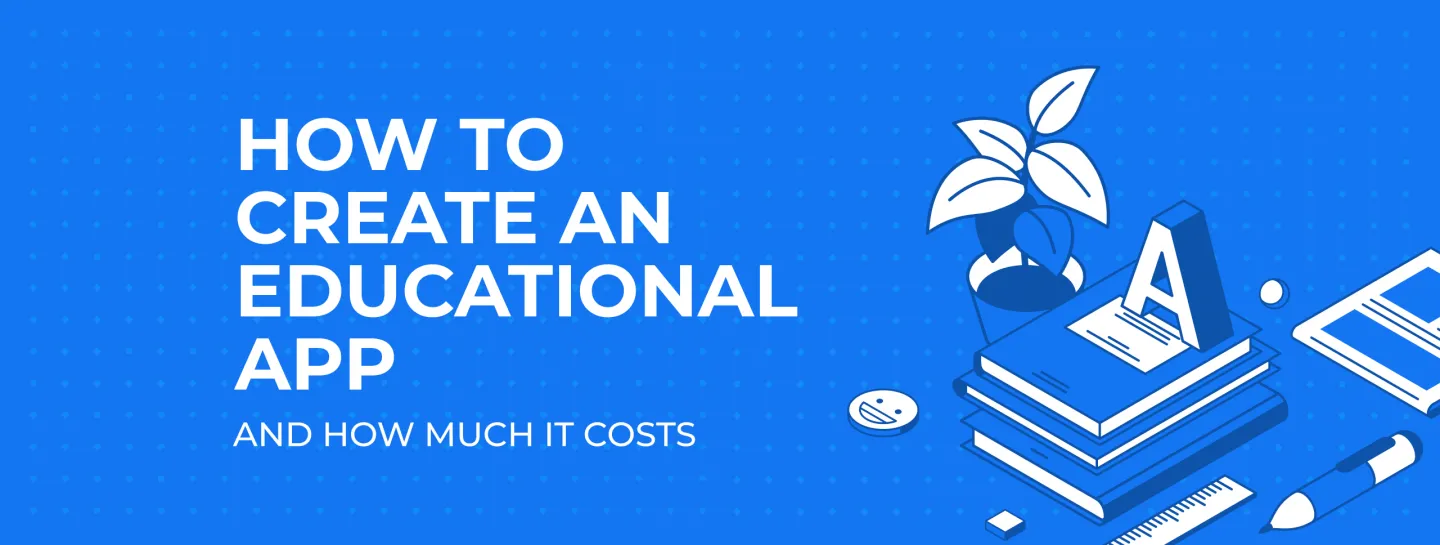
How To Create An Educational App - Guide and Costs for 2023

Table of contents
- Educational App Marketing Survey
- What is an Educational App?
- Educational Apps Types
- Categories of Educational Apps
- The Benefits of Educational Apps
- Trends in Educational App Development
- How to Create an Educational App?
- How Much Does the MVP of an Educational App Cost?
- Estimated Cost of Building an Educational App
- How to Monetize an Educational App
- Successful Examples of Educational Apps
- Cost estimation at Magora and Case Studies
- FAQ
- Final words
Educational App Marketing Survey
Our lives are rapidly moving towards a brave new world, where high technology penetrates all spheres and becomes routine. Innovations have changed the way we gain knowledge today. The COVID-19 pandemic boosted this effect. The old system of education doesn’t fill the bill as people are searching for convenience today. What is more, we must reinvent the way people learn today. When we implement a new technology, our brain starts functioning in a new manner, forming new neural pathways. That is why we need to create and adopt various educational approaches according to the target generation. If you question whether it is a good idea to create an educational website or an app, the statistics will help you clear up your doubts.
- The global eLearning Market is forecast to grow at a CAGR of 20% by 2028;
- By this time, the market will have reached £830 billion;
- The neighboring education technology market is expected to grow to £356 billion at a CAGR of 16.5% by 2030;
- A survey conducted by Bay View Analytics in the USA found that 73% of students would like to continue their studies online after the pandemic;
- Education is in third place among the most popular Apple App Store categories in 2022 with a share of 9.75%;
- In 2022, the most popular educational mobile app in the UK was Duolingo, which was downloaded over 1.9 million times.
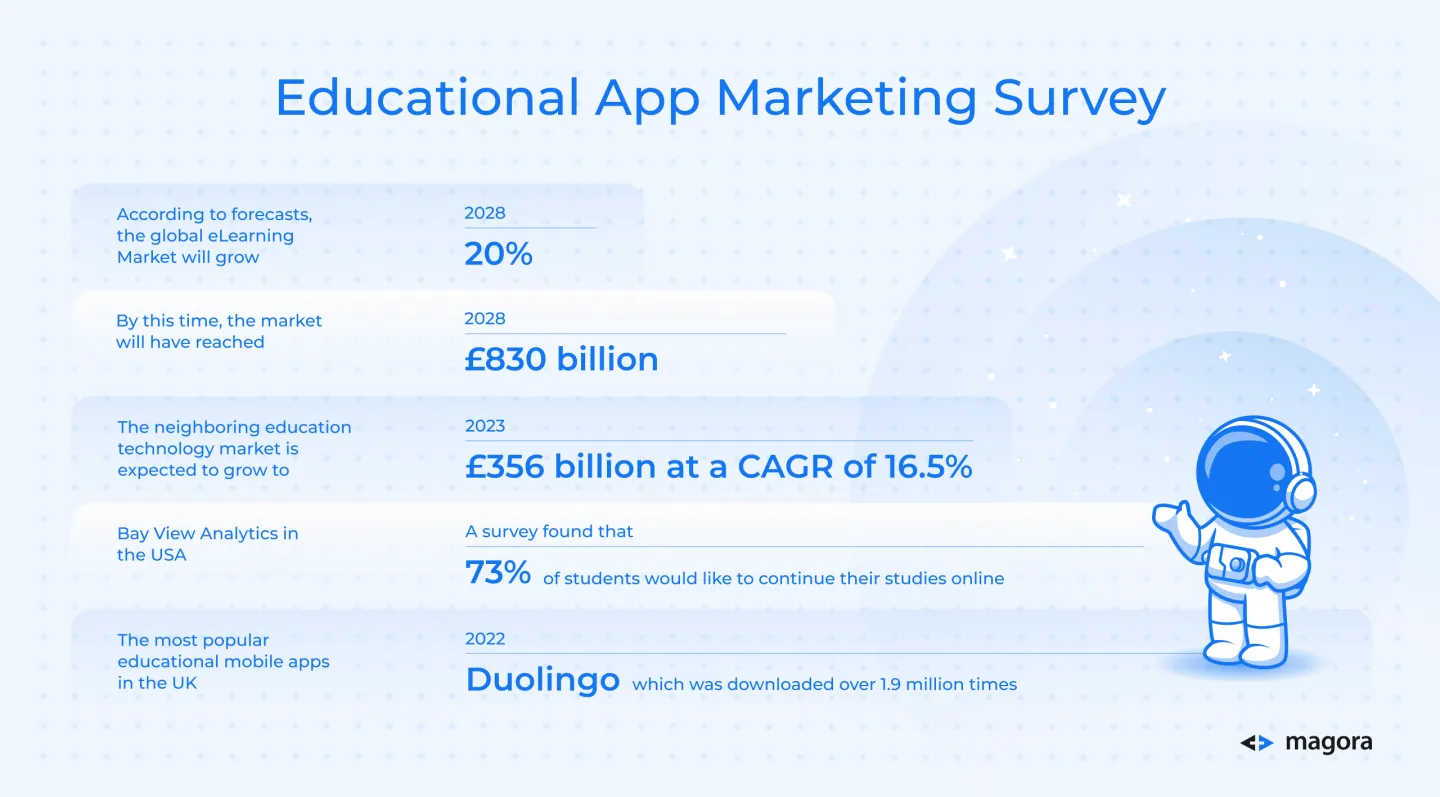
What is an Educational App?
Educational apps are software, the main purpose of which is to provide learning solutions and remote access to educational platforms, giving the user full knowledge of any kind. Generally speaking, the target group is pretty broad, as today anyone might need additional training regardless of age, location, and sometimes budget. The variety of eLearning apps in the market respond to a wide range of requests, such as:
- kids learning, starting with the basics and up to serious applications of in-depth knowledge;
- assistance to pupils and students in exam preparation;
- courses that are intended to enhance the qualification level of specialists;
- new knowledge supplies to expand horizons and become an expert in some field;
- learning empowerment of educational institutions;
- tools for teaching staff to monitor progress;
- additional options to expand the market for online course platforms.
Educational Apps Types
If we take users as the basis for designing an eLearning app, then we might categorize educational apps into two types aimed at:
- teachers;
- learners.
Educational apps for teachers
The first group is presented by the means that help teachers organize and create high-quality and effective lessons. These apps serve as a supplement to the lesson, turning it into an interactive process or serving as a source and storage for the learning materials. It is indisputable that it facilitates teachers’ working routines and saves their time. By helping with paperwork and managerial duties, such apps are able to alleviate professional burnout.
- apps to track progress;
- apps to store and share educational materials;
- apps to create lessons.
Educational apps for learners
This group is characterized by the variety of educational apps that are intended to make the learning process easier and more enjoyable. Let’s have a closer look at some of them.
Apps for kids
Through games in educational apps, kids are able to learn numbers, colors, solve logic problems, train their memory, and many other things. Examples are: Khan Academy, Best Math, Fish School.
Apps to prepare for exams
Quizlet, TCY, and Focus Dog: Study Timer are good solutions to help students memorize and process huge amounts of information, as well as increase self-discipline.
Apps providing online courses
Additional education or just for the sake of interest: platforms like Udemy or Coursera suggest thousands of courses for every taste. Try to resist and not choose all of them!
Language learning apps
Constant repetition is one of the keys to success in language learning. Apps with push notifications will help you maintain progress and select the best practices for your level. Babbel, Memrise, and Duolingo are among them.
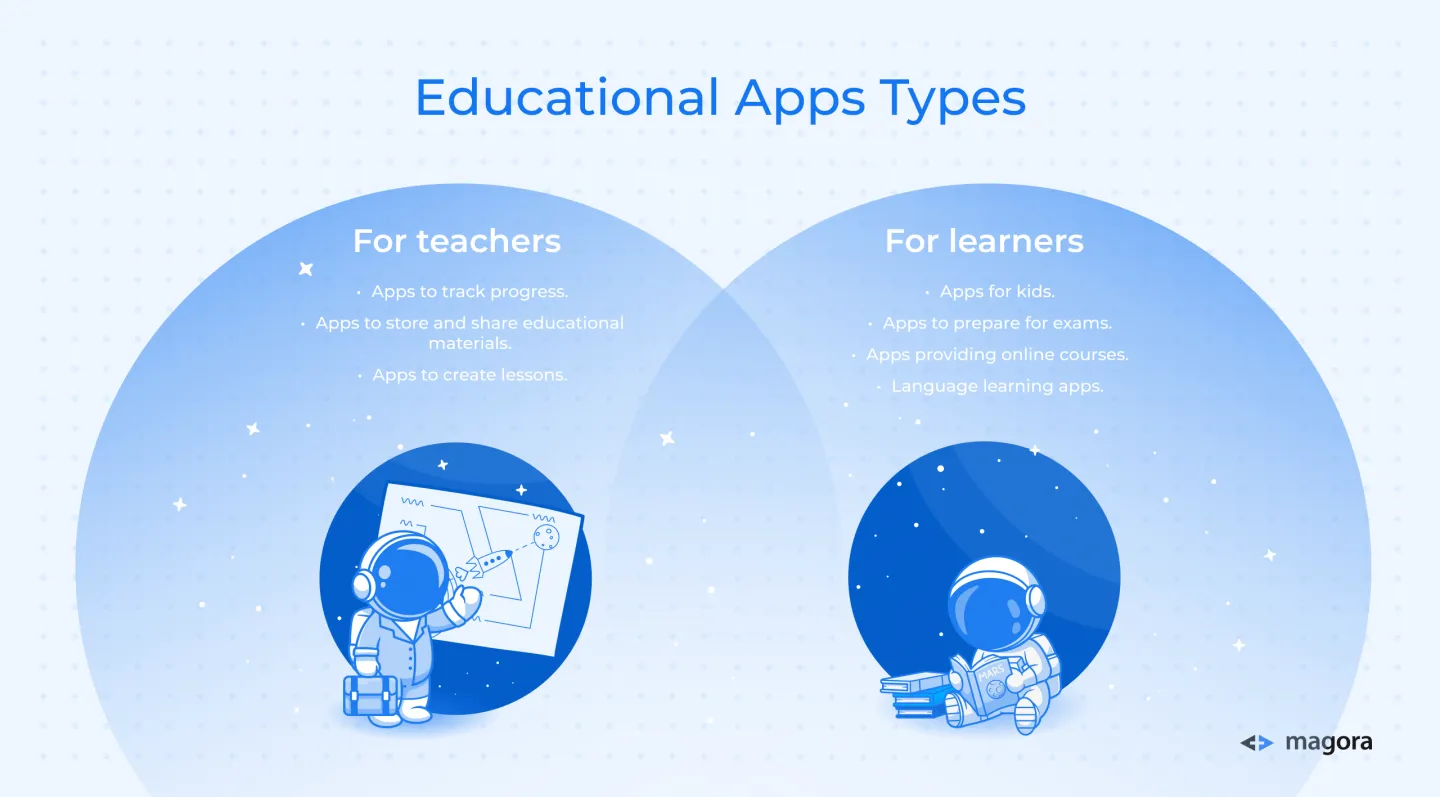
Categories of Educational Apps
Once you have chosen the audience that your application will be directed to, it is time to think about the purpose of your educational application. The more details you think about, the smoother the development process will be. Our brief review will introduce you to some of the categories.
Supporting tools
Such apps and software are the means of the eLearning process, not its goal. With the help of these tools, lessons are held more comfortably and well-organized.
- Classroom management apps (ClassIn, Zoom, Google Classroom, and Apple Classroom);
- Online dictionaries (Oxford Dictionary, Vocabulary.com, Merriam-Webster);
- Online libraries (Libib, Scribd, Epic!);
- Applications for taking notes (Evernote, nTask).
Learning platforms
These are comfortable apps and platforms that provide a number of eLearning courses, such as Udemy, Coursera, or edX. Different types of activities—videos, texts, or quizzes—allow students to enjoy the educational process.
Educational apps for narrowly focused studies
They say you need 20 hours to learn a new skill. This category of the app will help people learn or master a particular set of skills or one specific subject. For example, the Gibson App is to learn guitar.
Learning management system (LMS) apps
It is like an online school or university that has a courses and lessons database, convenient management tools, and the opportunity to control the whole learning process and monitor students’ performance. LMS optimizes training for learners. (EdApp Learning Management System, Schoology Education Platform).
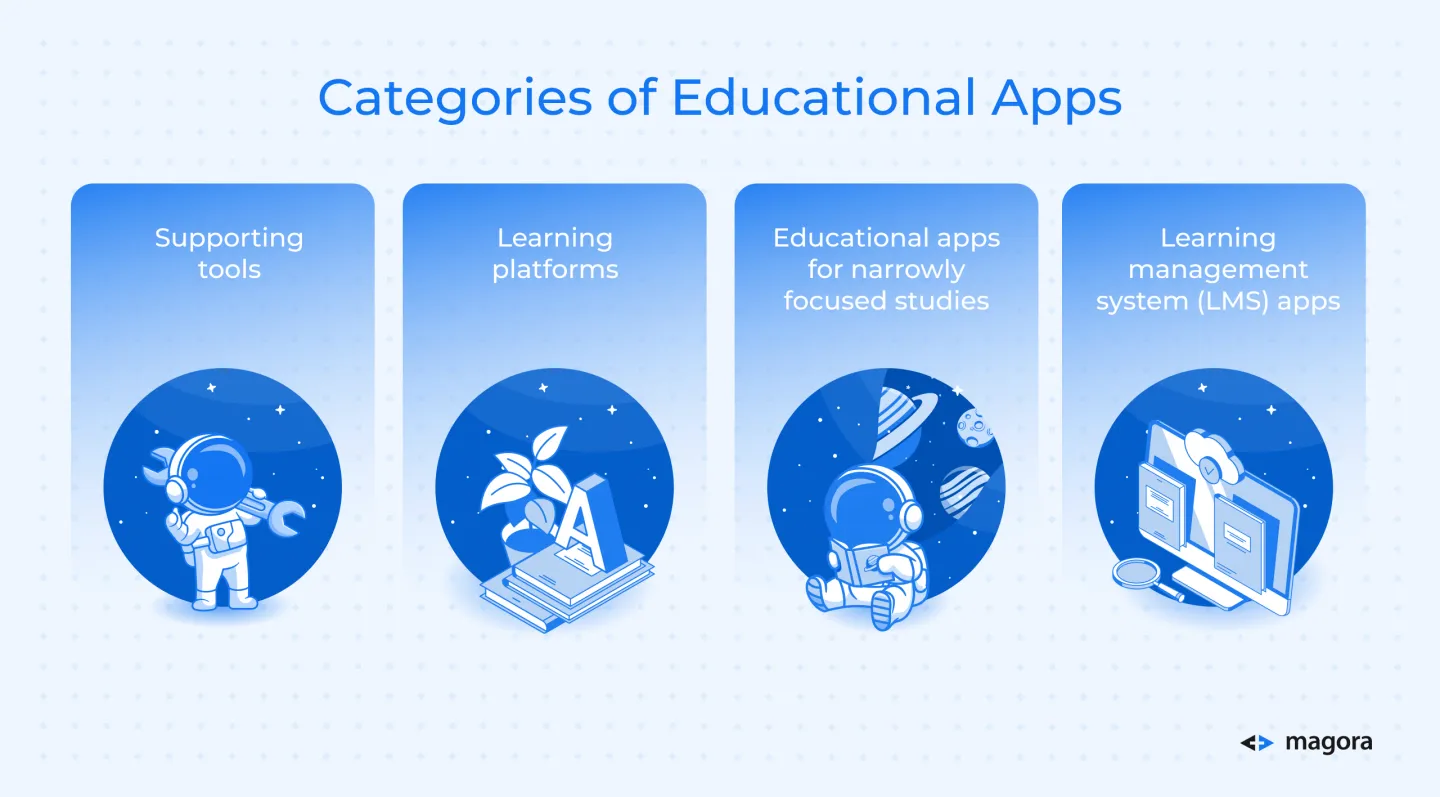
The Benefits of Educational Apps
The education system has evolved in order to keep up with the pace of people’s lives. We can no longer have one degree for our entire lives and be satisfied with it. It is commendable to master the skills that are necessary to learn a new profession at any age. We are all lifelong students, and that’s why we are in love with eLearning apps. Here are more factors that make this market flourish.
Mobile and portability
This is one of the top benefits of educational applications. At any time, at any place, users are able to organize their lesson. It becomes crucial in our high-speed lives, as in a long queue we are able to practice our writing skills in Spanish.
A broad spectrum of choice
One of the great challenges for people living in small towns was the shortage, or even absence, of options to choose courses from. They had to learn something they were not interested in. But today, educational apps and platforms afford grounds for choosing any course you like. There are still some areas that are poorly presented in the app, and it is essential to build a great mobile learning application to cover them.
Cost-effectiveness
It is not a surprise that a good traditional education may cost large sums of money. In comparison, your annual subscription will come out cheaper. Moreover, some platforms that deliver fundamental courses have long-term payment options. Such an option reduces the financial burden.
Increased engagement and modern methodologies
These concepts are closely connected, as the way we learn today affects our willingness to return to the educational process. A logically thought-through structure of the learning materials enables them to capture users’ attention, preventing them from procrastinating. For example, you may use different styles of learning, e.g., visual, auditory, reading/writing, and kinaesthetic.
Trends in Educational App Development
AR/VR
Augmented reality (AR) and Virtual Reality (VR) hold great potential to lead the educational industry to the next level. A complete immersion recreates ancient cities, places ranging from outer space to the underwater world, and more. Such technologies allow users to gain experience by facing different scenarios. These interactive technologies improve the depth of understanding and involvement. As an example, Elements 4D is a safe method for chemistry experiments. And no more tedious, monotonous textbooks due to 4D Interactive Anatomy.
Artificial Intelligence
Artificial Intelligence is a powerful tool that analyzes your learning rate, weak points, and preferences so as to choose the best solutions and learning style. Furthermore, AI is a good company to practice a foreign language, as we see in the Duolingo app. It brings a personal approach to studying.
Gamification
Make learning fun and fascinating. It is a popular tool that increases motivation and encourages students to pursue further training. Such features as badges, points, leaderboards, and levels sustain progress. A coherent narrative in games “triggers an emotional response, which in turn makes it memorable”.
Video content
Short videos remain popular: Instagram reels, Tik Tok, and YouTube are a clear confirmation of this. This kind of information presentation makes it easy to perceive and absorb content. In fact, educational videos positively impact the efficiency of processing and memory recall. Consider whether your app will benefit from learning video content.
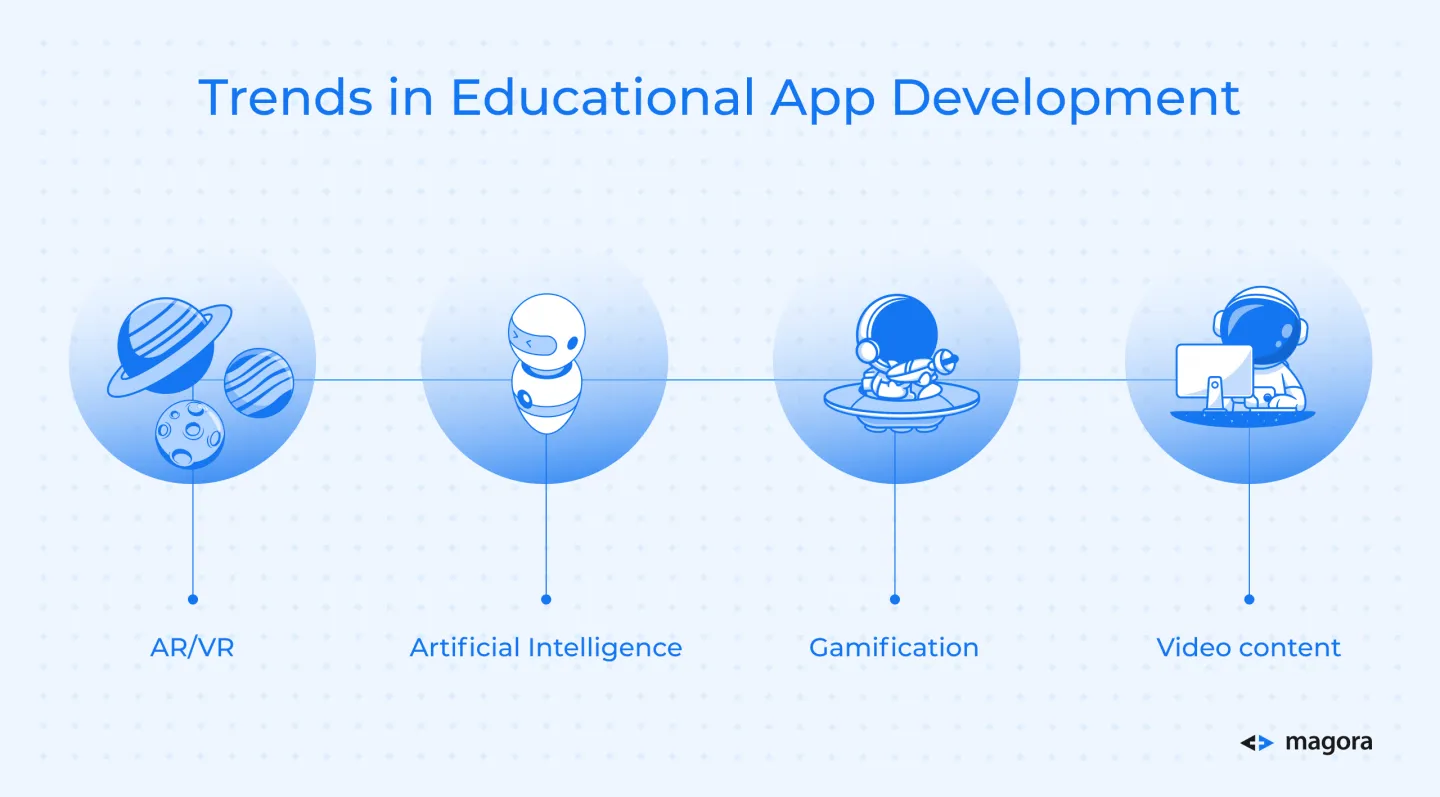
How to Create an Educational App?
Now we have come to one of the most important parts that describes the educational mobile app development process. Here are the main steps that you may refer to.
1. Discovery phase
We always advise you to pay particular attention to the initial preparatory stage. If you are not limited in time, the discovery phase will be of practical value. During this stage, we will:
- conduct complete market research, submitting documentation related to your target audience and your competitors. Every single detail helps to drive the center and make it succeed.
- highlight possible risks and their mitigation;
- create a design concept;
- establish time and expense frames;
- come up with a strategy for fast ROI achievement;
- ask will the app be native or cross-platform?
2. Design
It is a significant phase because the right user interface creates a delightful customer experience, convenient and smooth app operation. Don’t forget about 3D animations and illustrations for kids if the app tends to facilitate the learning process.
3. Programming
In this step, frontend and backend programmers will infuse the design with tailored functionality embodying your idea. You may always develop an MVP version with the core features only, which is cheaper and faster. But, this we will discuss later.
4. Testing
App testing and bug fixing are a must. Look before you leap, or double-check before you launch.
5. Deployment
It is high time to submit your product to stores and collect the first feedback. It should be remembered that all apps always require maintenance and system updates.
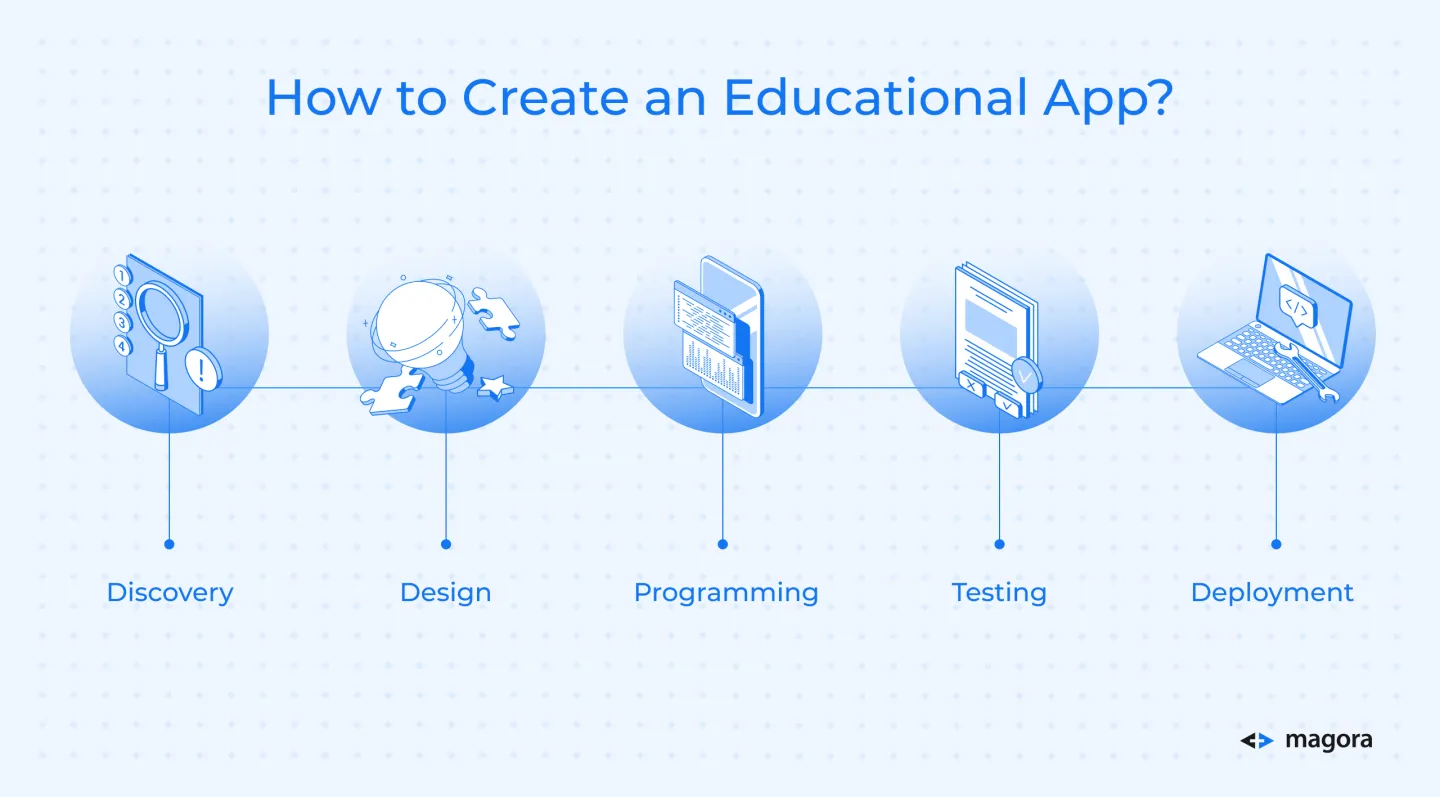
How Much Does the MVP of an Educational App Cost?
The cost of app development varies depending on many different factors, such as the complexity of the app and the size of your development team. Building a custom app with a unique feature set will add expense, but the final result of happy clients is absolutely worth it. However, in order to save money, we recommend starting with a minimum viable product, or MVP, first. It is an operable educational product with basic functionality that gives value to the users. In your turn, it is a wonderful opportunity to have a look at your clients and their real needs. Soon after, you may tune the app according to the market's reaction. It is like a test drive for your app.
So, the MVP development cost will range between £12,000 and £160,000. In order to calculate a more accurate measure, let’s focus on the “must-have” features that will reflect the essence of your app and also record the hours needed for its development. The numbers are still approximate. For precise estimates, please contact us.
| Auth/login | 90 hours |
| Search | 50 hours |
| User profile | 93 hours |
| Course | 36 hours |
| Payment option | 80 hours |
| Menu | 190 hours |
| Push notifications | 30 hours |
| Total | 569 hours |
This number includes only the hours needed for backend and iOS frontend development. Further, we should add UI/UX design, integration implementation, testing, and project management. The whole MVP development process will take 2,000–2,500 hours. That would be about £115,000 – £145,000 in monetary terms.
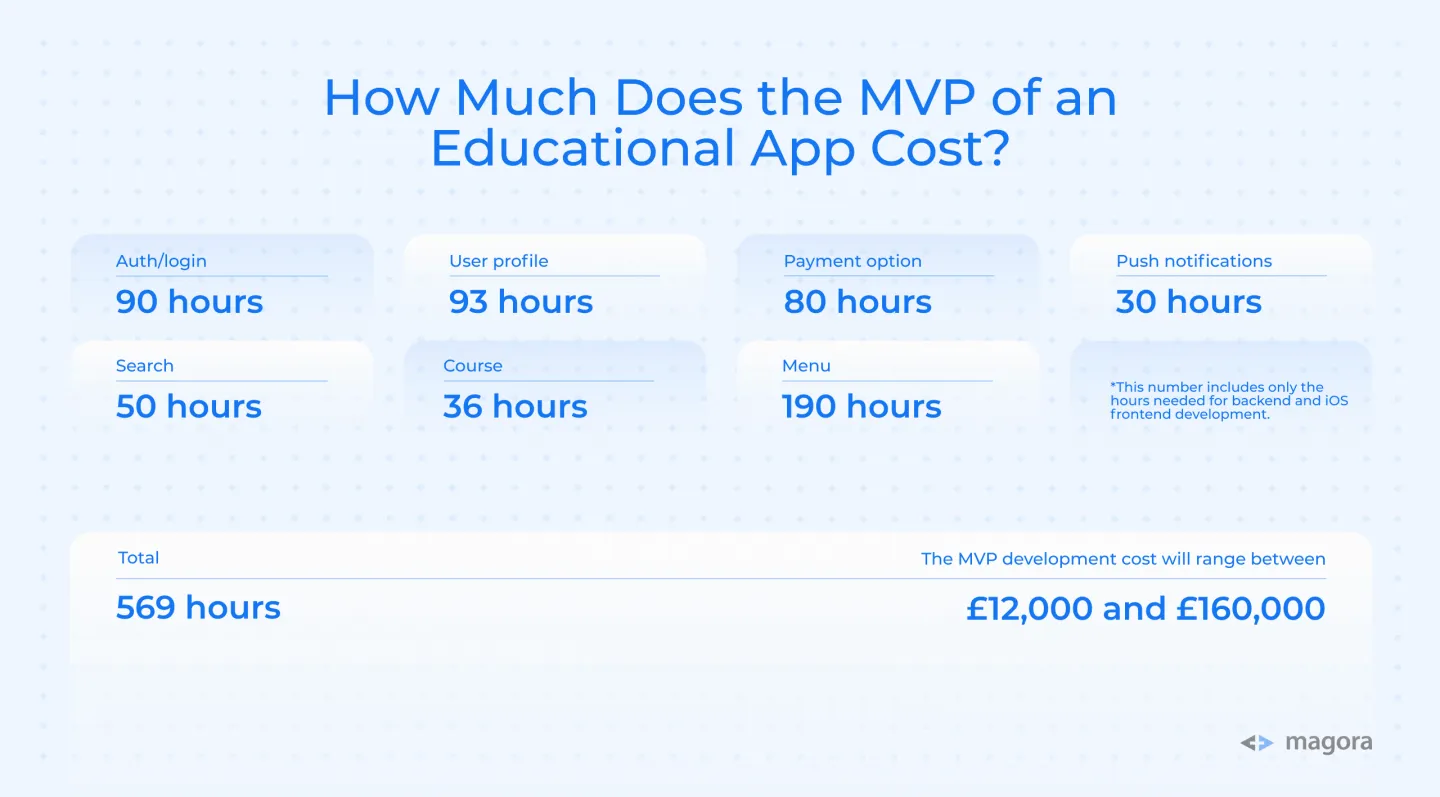
Estimated Cost of Building an Educational App
To answer the question: “How much does it cost to develop a web application or an app?” that will satisfy all the market’s needs and your purpose is quite challenging. The final cost is related to many different conditions, and, like in a kaleidoscope, one element can alter all of the configurations.
Below, we have gathered the factors that have a very significant impact on pricing:
Cutting-edge technology integrations such as AR/VR, IoT, and AI-based features need more time for development and add value to the final product.
The platform that your app will work on. Each platform, be it iOS or Android, needs an individual tech stack and its own development team. If you choose both platforms separately, it will double the expenses. In this case, the cross-platform app will have a lower cost.
Such design elements as animations, 3D graphics, or a custom interface for your educational application directly affect the number of hours needed for the development process.
Finally, the price changes according to the type of your software development team. Will it be an in-house option, freelancers, or an outsourcing eLearning app development company? In this article we give step-by-step tips on how to hire mobile app developers and make the right choice. The location of developers also plays a major role. Currently, the cost of the app development process is in the following price range:
- the USA and Canada: £100-£150/h;
- the UK: £70-£100/h;
- Eastern Europe: £30-£60/h;
- Asia and India: £30-£65/h.
When planning software development, it is essential to keep in mind the hidden costs as well. After the product launch, regular app maintenance is strongly recommended. The average annual expense will be between 15% and 20% of the initial budget. Moreover, marketing and advertising costs should be woven into the budget beforehand. The omission of such useful tools may cost your app’s success.
How to Monetize an Educational App
Money to spare likes good care, or a monetization model should be one of your top priorities. To draw investors’ attention, you need to have a deliberate plan for getting revenue. Your choice will depend on your potential customers and the type of your app. As an option, you may use several of them simultaneously.
Paid app
Users pay once per download and then have full, unlimited access. Such apps often have a trial period to attract the audience. On the other hand, customers have an opportunity to experience the app.
Subscription
This popular method of monetization implies a regular (every week, month, or year) subscription payment. Here you can offer personalized discounts for a long period of subscription.
Freemium
Your app is free to download, but has a premium membership, some features, or courses that require additional payment. This also might be in the form of a one-time payment or subscription.
In-app advertising
It is a good option for both sides, but only if you do not sacrifice the user experience. Make it smooth and non-irritating, and always be careful with the content of ads, especially in apps for children.
Author commission charges
It is a form of partnership when you lend a platform to different companies and authors whose courses are launched in your app. Depending on the courses’ popularity, price, and duration, you can charge a relevant commission.
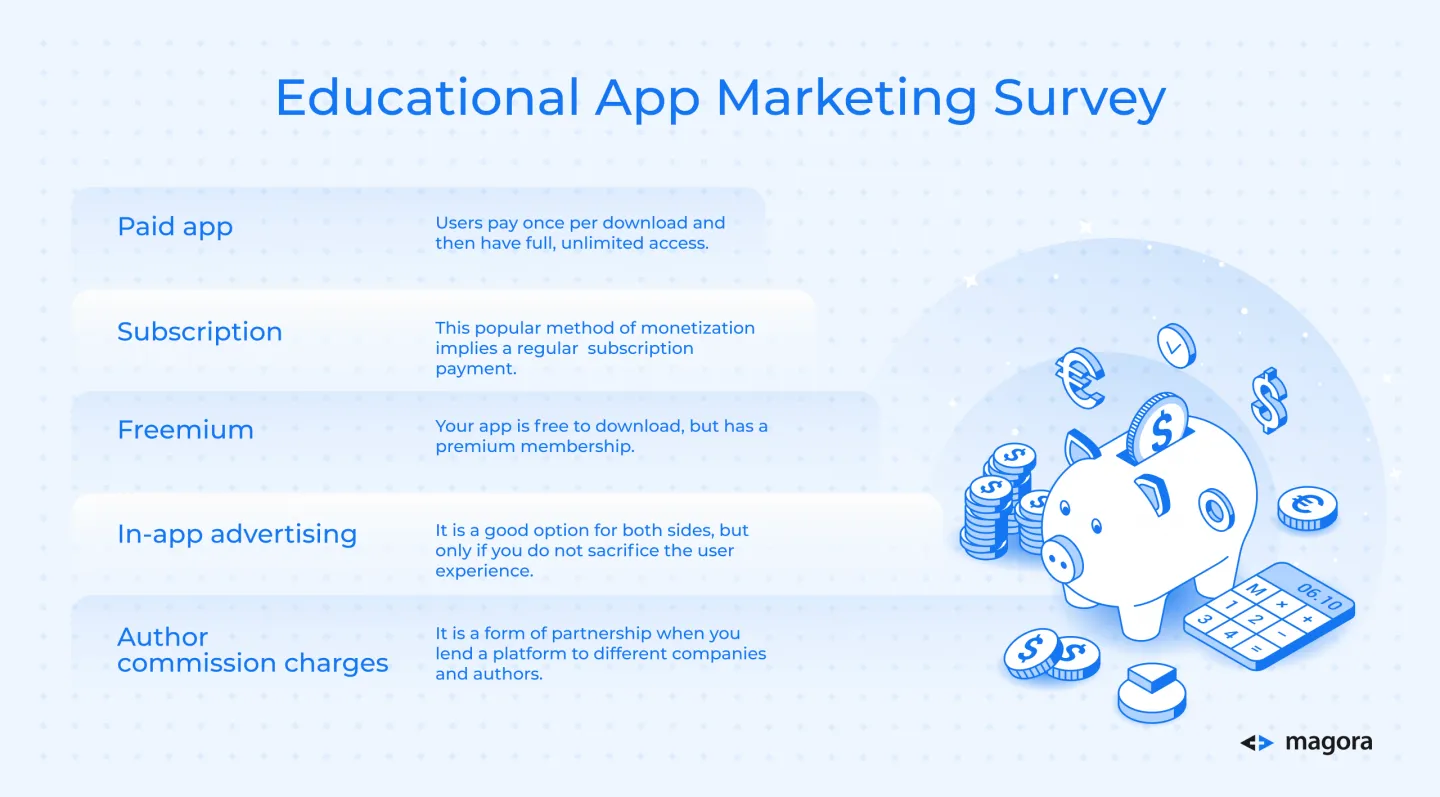
Successful Examples of Educational Apps
EdX
If you have ever dreamed about admission to the world-famous universities of the US, now you are a little bit closer to it, even if you stay in your hometown. EdX is an educational platform offering over 3,000 online courses and over 300 master’s and Ph.D. programs from universities like Harvard, MIT, and even the Microsoft company. 160 universities in general participated in the creation of a credible learning platform. Upon completion of the course, you are able to obtain a verified certificate if you have paid. A large proportion of the courses themselves are free of charge. EdX provides a wonderful opportunity to gain knowledge just by having your smartphone and not chasing your fellow students.
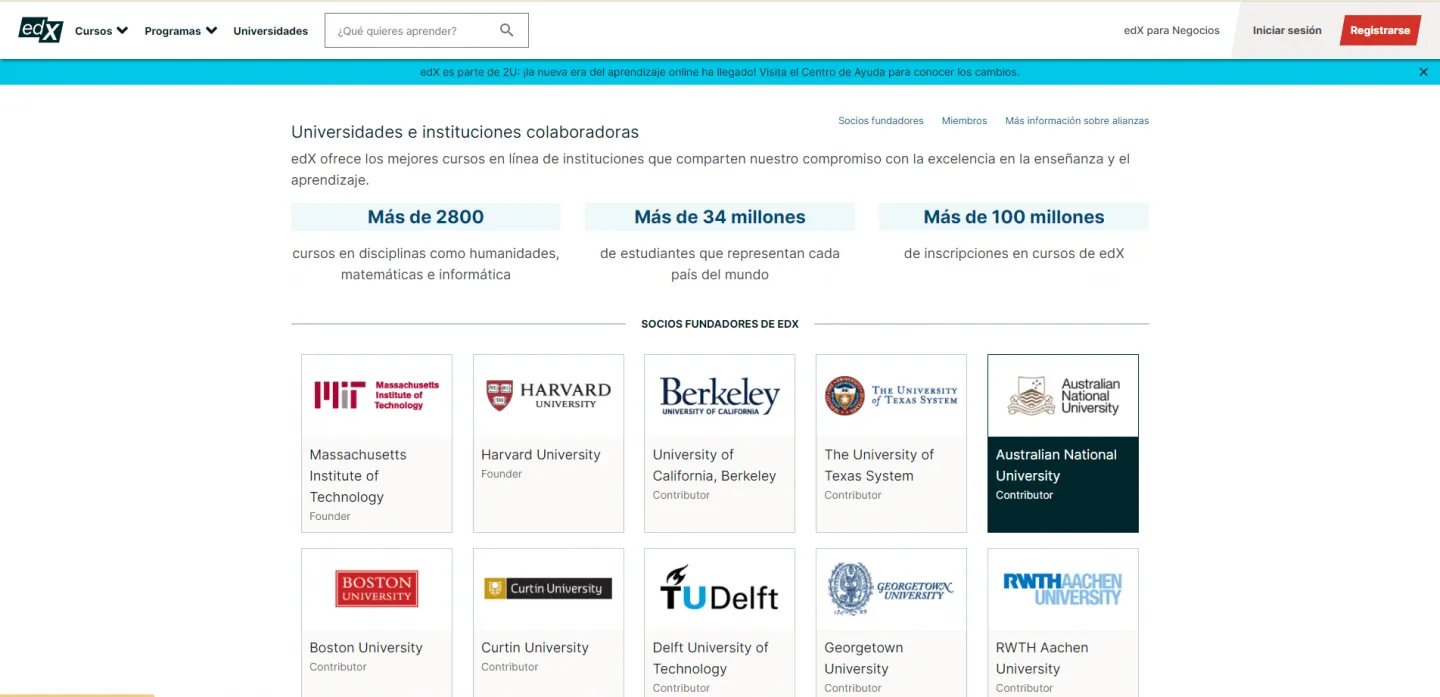
Khan Academy
Khan Academy is a non-profitable, worldwide educational platform with the mission of providing cost-free, first-class education to anyone, anywhere. Students are offered a wide range of school program courses for different subjects. The platform also includes test preparation materials such as prep for the SAT, MCAT, and LSAT. The courses are created by professional experts. Lessons are accompanied by videos, quizzes, and practice exercises that make them fun and interactive. To motivate users, Khan Academy uses progress tracking, gamification, and earning points.
The company’s operations and development are based on the donation system. For example, the Yass Foundation for Education has made a £7.5 million gift to create an online civics course for high school students.
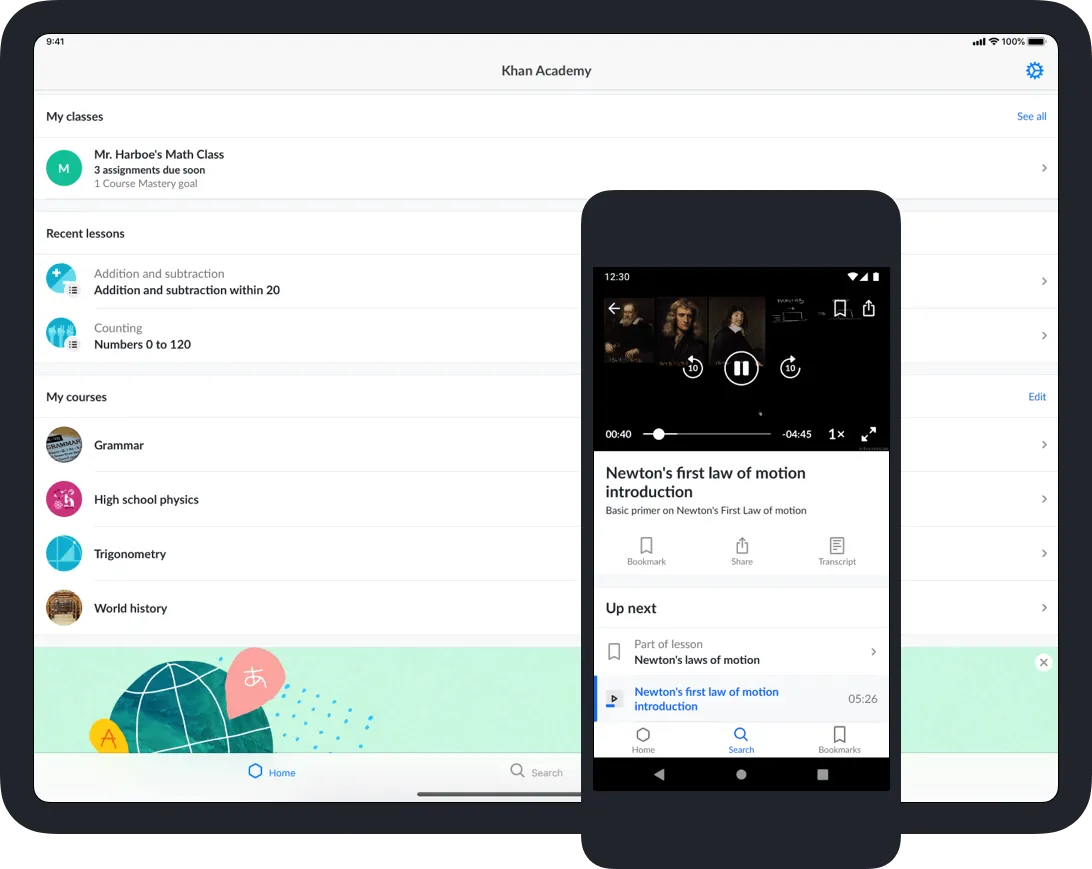
Brainly
In situations when a student cannot directly ask a teacher for help, he might go with his doubts to the Brainly app. It is a community of students and teachers that are ready to help each other in solving academic difficulties during studies, explaining problems in such subjects as algebra, geography, and law. The app’s main aim is to share knowledge and inspire students to find the right solutions by acting collaboratively. The motivation points encourage users to answer questions. Now the number of active users has reached 300+ million. In terms of financial performance, Brainly’s annual revenue is £8.3 million.
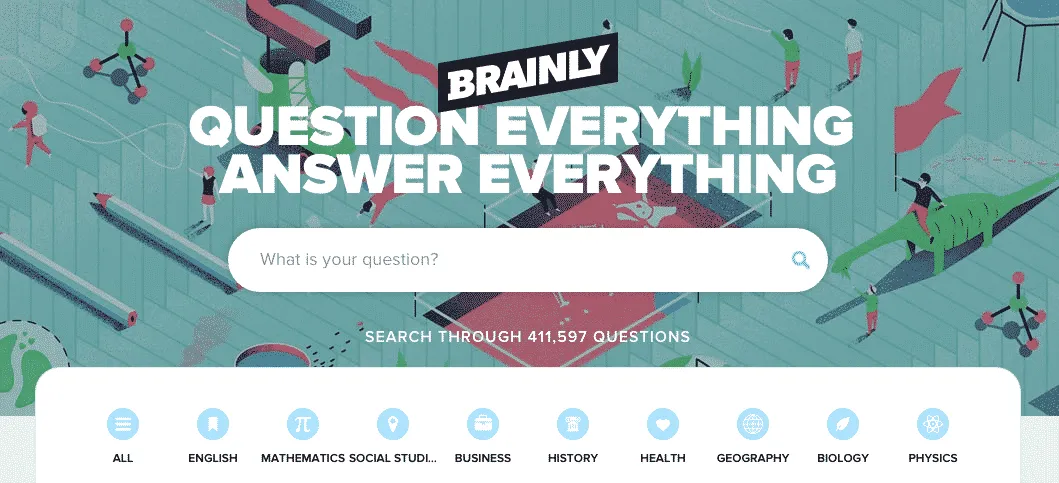
Cost estimation at Magora and Case Studies
Educational projects that we work on give us great pleasure because we are happy to make both sides, teachers and students, satisfied with new tools in order to succeed in obtaining new skills as well as knowledge transfer. Magora’s seasoned professionals implement any of your bold ideas with passion, whether it's an appealing iOS app called Pocket CPE for certified experts who continue education. Or, a math problem solver, Symbolab, that helps students with homework and scientists with challenges at work. By the way, this app has over 200 million users worldwide. Once, we had a case concerning mind mapping. This method is widespread in the educational sphere and lies in the visualization of the concept and its structurization using diagrams. Eventually, we created the Mind Manager app that delivered the full performance for convenient work. Among our projects are an educational video platform, Core Power Golf, for golf enthusiasts; a Timeline web application that allows drawing custom timelines and attaching additional data to them like photos, videos, etc.; and also a versatile online PDF editor, WorkPack, with a rich number of settings.
When you come to Magora, you will be satisfied with the accuracy and transparency of the software development cost estimation. We aspire to a combination of top-quality apps at a fair price, as we care about your success. At the discovery phase, we will sort through all potential expenses, reasonably arguing every step. Here we also give you strategies on how to avoid extra costs or even reduce them.
FAQ
What factors affect the cost of mobile app development?
The total cost of educational software development depends on the following factors:
- the complexity of the app;
- platform requirements;
- software development team location and number of professionals in it;
- app design.
How much does it cost to make an educational app?
Averagely, an MVP version costs between £12,000 and £160,000, and it starts at £25,000 and goes up to £300,000+ for the full functionality app. Each project has its own specific issues; hence, we are ready to discuss the feasibility of your idea and then give you a total expenditure measurement.
What are the common monetization models for educational apps?
Your business, undoubtedly, must be profitable. In order to achieve this goal and get maximum revenue, the following option for monetization models should be considered:
- Paid app
- Subscription
- Freemium
- In-app advertising
- Author commission charges
Final words
“Knowledge is power” is a phrase that already sounds like a cliche, but that doesn’t mean it isn’t true. Highly-skilled professionals encourage businesses to make further improvements. Affordable education has spread around the globe. The online learning industry will only grow and evolve. We hope that this article clarifies the educational app development issues and will help you stay ahead of the curve in assessing your business perspectives. Magora is an eLearning app development company that has an experienced software development team who is enthusiastic about challenges and supportive of ideas of any size. Drop us a line, and we will start planning a strategy for your project fulfillment right away.





